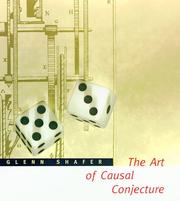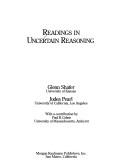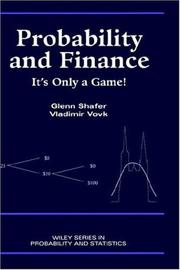| Listing 1 - 10 of 15 | << page >> |
Sort by
|

ISBN: 026219368X 9780262290999 9780262193689 0262290995 Year: 1996 Publisher: Cambridge (Mass.) : MIT press,
Abstract | Keywords | Export | Availability | Bookmark
 Loading...
Loading...Choose an application
- Reference Manager
- EndNote
- RefWorks (Direct export to RefWorks)
"In The Art of Causal Conjecture, Glenn Shafer lays out a new mathematical and philosophical foundation for probability and uses it to explain concepts of causality used in statistics, artificial intelligence, and philosophy.The various disciplines that use causal reasoning differ in the relative weight they put on security and precision of knowledge as opposed to timeliness of action. The natural and social sciences seek high levels of certainty in the identification of causes and high levels of precision in the measurement of their effects. The practical sciences--medicine, business, engineering, and artificial intelligence--must act on causal conjectures based on more limited knowledge. Shafer's understanding of causality contributes to both of these uses of causal reasoning. His language for causal explanation can guide statistical investigation in the natural and social sciences, and it can also be used to formulate assumptions of causal uniformity needed for decision making in the practical sciences.Causal ideas permeate the use of probability and statistics in all branches of industry, commerce, government, and science. The Art of Causal Conjecture shows that causal ideas can be equally important in theory. It does not challenge the maxim that causation cannot be proven from statistics alone, but by bringing causal ideas into the foundations of probability, it allows causal conjectures to be more clearly quantified, debated, and confronted by statistical evidence."
Artificial intelligence. Robotics. Simulation. Graphics --- Mathematical logic --- Artificial intelligence. --- Causation. --- Prediction (Logic) --- Probabilities. --- 681.3*I24 --- 681.3*F41 --- Probability --- Statistical inference --- Combinations --- Mathematics --- Chance --- Least squares --- Mathematical statistics --- Risk --- Conjecture --- Judgment (Logic) --- Causality --- Cause and effect --- Effect and cause --- Final cause --- Beginning --- God --- Metaphysics --- Philosophy --- Necessity (Philosophy) --- Teleology --- AI (Artificial intelligence) --- Artificial thinking --- Electronic brains --- Intellectronics --- Intelligence, Artificial --- Intelligent machines --- Machine intelligence --- Thinking, Artificial --- Bionics --- Cognitive science --- Digital computer simulation --- Electronic data processing --- Logic machines --- Machine theory --- Self-organizing systems --- Simulation methods --- Fifth generation computers --- Neural computers --- Knowledge representation formalisms and methods: frames and scripts; predicate logic; relation systems; representation languages; procedural and rule-based representations; semantic networks (Artificial intelligence) --- Mathematical logic: computability theory; computational logic; lambda calculus; logic programming; mechanical theorem proving; model theory; proof theory;recursive function theory--See also {681.3*F11}; {681.3*I22}; {681.3*I23} --- 681.3*F41 Mathematical logic: computability theory; computational logic; lambda calculus; logic programming; mechanical theorem proving; model theory; proof theory;recursive function theory--See also {681.3*F11}; {681.3*I22}; {681.3*I23} --- 681.3*I24 Knowledge representation formalisms and methods: frames and scripts; predicate logic; relation systems; representation languages; procedural and rule-based representations; semantic networks (Artificial intelligence) --- Prediction (Logic). --- Artificial intelligence --- Causation --- Probabilities --- COMPUTER SCIENCE/General
Book
ISBN: 0691081751 069110042X 9780691081755 9780691100425 Year: 1976 Publisher: Princeton: Princeton university press,
Abstract | Keywords | Export | Availability | Bookmark
 Loading...
Loading...Choose an application
- Reference Manager
- EndNote
- RefWorks (Direct export to RefWorks)
Stochastic processes --- Theory of knowledge --- Probabilities --- Mathematical statistics --- Evidence --- Probability --- Statistical inference --- Mathematics --- Statistics, Mathematical --- Proof --- Statistical methods --- Statistique mathématique --- Combinations --- Chance --- Least squares --- Risk --- Statistics --- Sampling (Statistics) --- Belief and doubt --- Faith --- Logic --- Philosophy --- Truth --- Statistique mathématique
Book
Year: 1976 Publisher: Princeton (N.J.) : Princeton university press,
Abstract | Keywords | Export | Availability | Bookmark
 Loading...
Loading...Choose an application
- Reference Manager
- EndNote
- RefWorks (Direct export to RefWorks)
Book
ISBN: 9780691214696 Year: 2021 Publisher: Princeton, NJ
Abstract | Keywords | Export | Availability | Bookmark
 Loading...
Loading...Choose an application
- Reference Manager
- EndNote
- RefWorks (Direct export to RefWorks)

ISBN: 1558601252 Year: 1990 Publisher: San Mateo, CA : Morgan Kaufmann Publishers,
Abstract | Keywords | Export | Availability | Bookmark
 Loading...
Loading...Choose an application
- Reference Manager
- EndNote
- RefWorks (Direct export to RefWorks)
Artificial intelligence --- Reasoning --- Uncertainty (Information theory) --- 681.3*I20 --- Measure of uncertainty (Information theory) --- Shannon's measure of uncertainty --- System uncertainty --- Information measurement --- Probabilities --- Questions and answers --- Argumentation --- Ratiocination --- Reason --- Thought and thinking --- Judgment (Logic) --- Logic --- AI (Artificial intelligence) --- Artificial thinking --- Electronic brains --- Intellectronics --- Intelligence, Artificial --- Intelligent machines --- Machine intelligence --- Thinking, Artificial --- Bionics --- Cognitive science --- Digital computer simulation --- Electronic data processing --- Logic machines --- Machine theory --- Self-organizing systems --- Simulation methods --- Fifth generation computers --- Neural computers --- Artificial intelligence (AI) in general; cognitive simulation; philosophical foundations --- 681.3*I20 Artificial intelligence (AI) in general; cognitive simulation; philosophical foundations --- Artificial intelligence.
Book
ISBN: 3031059875 3031059883 Year: 2022 Publisher: Cham, Switzerland : Springer,
Abstract | Keywords | Export | Availability | Bookmark
 Loading...
Loading...Choose an application
- Reference Manager
- EndNote
- RefWorks (Direct export to RefWorks)
Martingales (Mathematics) --- Martingales (Matemàtica) --- Processos estocàstics --- Stochastic processes

ISBN: 0471402265 Year: 2001 Publisher: New York : J. Wiley & Sons,
Abstract | Keywords | Export | Availability | Bookmark
 Loading...
Loading...Choose an application
- Reference Manager
- EndNote
- RefWorks (Direct export to RefWorks)
Investments --- Statistical decision. --- Financial engineering. --- Investissements --- Prise de décision (Statistique) --- Ingénierie financière --- Mathematics. --- Mathématiques
Book
ISBN: 9781118547939 Year: 2019 Publisher: Newark John Wiley & Sons, Incorporated
Abstract | Keywords | Export | Availability | Bookmark
 Loading...
Loading...Choose an application
- Reference Manager
- EndNote
- RefWorks (Direct export to RefWorks)
Book
ISBN: 1118548027 1118547934 1118548035 9781118548028 9781118547939 9781118548035 Year: 2019 Publisher: Newark John Wiley & Sons, Incorporated
Abstract | Keywords | Export | Availability | Bookmark
 Loading...
Loading...Choose an application
- Reference Manager
- EndNote
- RefWorks (Direct export to RefWorks)
Game-theoretic probability and finance come of age Glenn Shafer and Vladimir Vovk’s Probability and Finance , published in 2001, showed that perfect-information games can be used to define mathematical probability. Based on fifteen years of further research, Game-Theoretic Foundations for Probability and Finance presents a mature view of the foundational role game theory can play. Its account of probability theory opens the way to new methods of prediction and testing and makes many statistical methods more transparent and widely usable. Its contributions to finance theory include purely game-theoretic accounts of Ito’s stochastic calculus, the capital asset pricing model, the equity premium, and portfolio theory. Game-Theoretic Foundations for Probability and Finance is a book of research. It is also a teaching resource. Each chapter is supplemented with carefully designed exercises and notes relating the new theory to its historical context. Praise from early readers “Ever since Kolmogorov's Grundbegriffe , the standard mathematical treatment of probability theory has been measure-theoretic. In this ground-breaking work, Shafer and Vovk give a game-theoretic foundation instead. While being just as rigorous, the game-theoretic approach allows for vast and useful generalizations of classical measure-theoretic results, while also giving rise to new, radical ideas for prediction, statistics and mathematical finance without stochastic assumptions. The authors set out their theory in great detail, resulting in what is definitely one of the most important books on the foundations of probability to have appeared in the last few decades.” – Peter Grünwald, CWI and University of Leiden “Shafer and Vovk have thoroughly re-written their 2001 book on the game-theoretic foundations for probability and for finance. They have included an account of the tremendous growth that has occurred since, in the game-theoretic and pathwise approaches to stochastic analysis and in their applications to continuous-time finance. This new book will undoubtedly spur a better understanding of the foundations of these very important fields, and we should all be grateful to its authors.” – Ioannis Karatzas, Columbia University
Finance --- Game theory. --- Statistical methods. --- Mathematical models. --- E-books
Multi
ISBN: 9780691214696 Year: 2021 Publisher: Princeton, N.J. Princeton University Press
Abstract | Keywords | Export | Availability | Bookmark
 Loading...
Loading...Choose an application
- Reference Manager
- EndNote
- RefWorks (Direct export to RefWorks)
| Listing 1 - 10 of 15 | << page >> |
Sort by
|

 Search
Search Feedback
Feedback About UniCat
About UniCat  Help
Help News
News